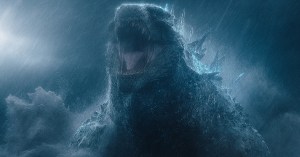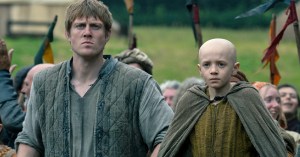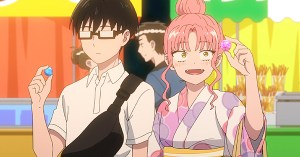Director Duncan Jones on Mute and His Maybe, Probably Unhealthy Twitter Habit
Rotten Tomatoes talks to the director of Moon and Warcraft as he releases a new film starring Alexander Skarsgård, Paul Rudd, and Justin Theroux.
When director Duncan Jones put a call out on Twitter, inviting press to speak to him about his new film, Mute, we gladly took him up on that offer.
The Netflix release is Jones’ fourth feature film, after science fiction titles Moon and Source Code and fantasy spectacle Warcraft, which, despite a tepid critical reception and U.S. box office, went on to make a whopping $433 million internationally (mostly in China).
But Mute, a noir near-future story, is a 16-year labor of love for the director and stars a trio of buzzy actors: Alexander Skarsgård, Paul Rudd, and Justin Theroux.
Production began in September 2016 at a time of great change in the director’s life; his first child was born two months before, and his father, rock icon David Bowie, had died eight months prior. The film, in fact, is dedicated to Bowie – under his birth name “David Jones” – as well as to Marion Skene, Jones’ nanny who helped raise him and who died in January 2017.
For a sci-fi film, Mute is surprisingly intimate. Written by Jones and Michael Robert Johnson (Sherlock Holmes), the film tells the story of Leo (Skarsgård), a Berlin man who lost his voice in a childhood accident and crosses paths with two sketchy U.S. Army surgeons — Cactus Bill (Rudd) and Duck (Theroux) — while searching the city’s seedy underbelly for his missing girlfriend, Naadirah (Seyneb Saleh).
Jones told us about the film’s long road to its Netflix release, his Twitter habit, and making original sci-fi.

Debbie Day for Rotten Tomatoes: You’re so active on Twitter, does it just eat your brain cells? I mean, is it exhausting?
Duncan Jones: It is, and it’s probably unhealthy. And I accept that it’s probably something I wrestle with as far as how much I’m on it. At the same time, I think it gives me an avenue to vent about certain things that I just wouldn’t want to bring home.
So, I think it has positives and negatives, and I think it probably leaves me as a more balanced person in my day-to-day real life to be able to “bah” out into Twitter and then be kind of a little bit more relaxed and normal at home.
RT: I read that you were influenced by being in Berlin with your father when you were young.
Jones: Berlin is very dynamic and changing city, in my experience — I’ve been there since the 1970s; I’ve seen it change — [and] it always has been. Even back then when I was a little kid … the wall was still up, and it was this tiny little island of Western culture in the middle of the Soviet Union.
We were there for about a year and a half. I was pretty young, but I was at school. There was an American military academy, and I was kind of parked there while we were in Berlin, so I kinda got to see a very different side of it than obviously my dad was experiencing. But it still had an impact on me even at that young age.
And then later on, I came back to Berlin. I was a rugby player when I was growing up, so I was part of a rugby team that came back to Berlin just before the wall came down. And then over the decades since, I’ve been back again and again; sometimes just for fun, sometimes as part of a location recceing for the various versions of the film we tried to make over those 16 years. And I really had seen dramatic change. Every time I went, the city was different. And I think because of the unification, because of all these Eastern European/Soviet buildings being repurposed as nightclubs and bars and restaurants. It was such a dynamic city, and again, it always felt like a city that was looking over the horizon as to “Where are we going?” instead of “Where are we now?”
That was one of the reasons that Berlin was kind of one of the more interesting possible settings for Mute. It had to serve a few purposes, one of which was it had to be a place that felt foreign enough to Cactus in particular that he wanted to get home and get away from this place. But at the same time, it had to be somewhere that felt dynamic and interesting and exciting enough to be a city in the future I would want to spend some time in.

RT: You show some the dark parts of society in Mute.
Jones: It’s a noir story, so it does take place in the seediest sides of Berlin. I think I probably avoid the more hateful sides of what that could be, it’s more kind of just gross and sex-based than the more violent and hateful side … There are not that many racist depictions in it. There are certainly sexist ones, and Cactus and Duck are very much a portrayal of a side of America that the rest of the world sees that maybe America doesn’t see of itself that much: where they’re brash and loud and funny and very entertaining, but at the same time kind of scary and intimidating. That’s kind of an America that I think those of us who are not from America sometimes see. So I think it’s a film which kind of will be seen from very different perspectives depending on where you’re from.
https://twitter.com/halhickel/status/966889355569651712
RT: Can you say how Mute came to be?
Jones: Mike Johnson and I wrote this script back 16 years ago. I think I had just finished film school. I’d written a script myself, which was kind of like a sci-fi 12 Angry Men. It was a court drama, lots of dialogue, really not cinematic, and it was frustrating the hell out of me, beause it was a film that I’d written, again, designed for low-budget, first-feature, how-can-I-make-a-film-for-as-little-money-as-possible courtroom drama. So that was the idea, and it just wasn’t working, and it wasn’t gonna be right.
So a friend of mine, who actually ended up being the editor on this film, Barrett Heathcote, he said, “Well, why don’t you try and write a protagonist who doesn’t speak or doesn’t speak as much?” And I went in that direction and took on that challenge. And as I was writing Leo’s character, it occurred to me that I don’t know if I can make this work for an entire film, but if I can split our time we spend with Leo with someone else who’s much more talkative just to kind of give the balance to it, that would work.
And that’s where the idea for Cactus and Duck came from, who are really a riff on Robert Altman‘s Trapper John and Hawkeye Pierce from the original M*A*S*H movie. I loved those two guys, and I thought, those two guys are really interesting, and much as I love them and find them so entertaining, they’re kind of mean. What if they were even meaner? What if they were actually villains? And that’s where Cactus and Duck came from.

RT: The film has a really great cast. And how did each of them come on board?
Jones: There are kind of three main groups of casting. Leo, obviously, and I always needed a physical presence for that character. I needed the talents and the abilities, obviously, of an actor who could perform that role. But I also needed a physical presence because what makes Leo tick and what makes him work is really how other people react to him. Whether they’re intimidated by him or they think he’s an idiot or they think he’s the tall, silent type, everyone kind of brings their own baggage to this big, quiet guy who turns up in front of them. And that’s kind of what I needed.
So, there weren’t that many big, tall guys who are really great actors that I was able to find. But Alex was absolutely somebody I felt very comfortable with. And I think what won me over with him is when we had our meeting, he felt intimidated about playing the part. And I think knowing that he realized how difficult it was gonna be gave me confidence that he understood how difficult it was gonna be. So he was a great find.
Cactus and Duck was always meant to be an homage to Trapper John and Hawkeye Pierce. And I knew that I needed the same level of chemistry that you would want between a leading man and a romantic relationship. Not that it was romance, but you needed to believe the bond between those two characters. It was tricky to find the right people. I always loved Paul Rudd, and I thought he would make a great Cactus. But finding out that him and Justin were buddies in real life and knowing that Justin and him were both writers, I think gave me a lot of confidence. And when I got a chance to meet them and talk about it and they were willing to jump into this homage to Trapper and Hawkeye, that’s when I felt very comfortable that it was going to work out really well with them.
And the final piece was Seyneb Saleh who plays Naadirah, who is the love interest at the start of the movie who has to live on throughout the rest of the movie. She’s based in Vienna, but she’s from Berlin originally. She’s Middle Eastern descent, and she understood what it is that this character needed to be. Somebody that you could believe Leo had fallen for but kind of at arm’s length in a sense. The more he learns about her when she’s gone, the more he realizes he didn’t really know her. And that’s kind of what Leo’s detective story is all about. So those were kind of the three main casting, and then the rest was a mix of fun cameos for me, bringing Sam Rockwell back.
RT: Let’s talk about that. When I was watching it, I thought, Oh, it’s set in the same timeline as Moon!
Jones: Well, I think the way I treated it is almost like an anthology. This film and Moon, and then there’s a third film I hope to make, they’re all separate, independent stories, but they exist in the same timeline and it’s the same world. And if I can have little ideas that cross-pollinate and give you a sense that “Oh yeah, this is all tied together” without it being one film dependent on the next or one film a sequel to another, I thought it was kind of a nice opportunity to tie them together.

RT: We’re going through a period in which so many filmmakers are revisiting old franchises, and you have done very original things — aside from Warcraft, the video game adaptation.
Jones: It’s been a fight, though. And that’s why I’ve only made four films in however many years it’s been, like 10 years.
RT: What do you think about that? Have you plotted a harder road for yourself maybe?
Jones: Yeah I have, I definitely have. I don’t regret it, other than I like to work, I enjoy making movies, that’s what I want to do with my life, and it makes getting those movies made more difficult. But streaming has really opened up an avenue for original films and unusual ideas, and I think the studio system has made a business decision to focus on big four-quad franchises, sequels, prequels, remakes, reboots, preexisting known quantities because the windows theatrically now are so jammed with tentpole after tentpole.
I think if you’re very lucky, you can find a two-week window, and that’s when a studio film has to make most of its money back. There used to be independent arms of the studios making more original films in that 20- to 40-million-dollar range, and most of those closed down. Eventually as many of these sequels, prequels, franchise films as [studios] make, I can’t help thinking, even though they’re bringing in original voices to tell those stories, unless they bring in original material, eventually people are going to tire of them, I think.
So I think the fact that Netflix and Amazon and Apple are basically taking up the slack is a huge boon to all of us who want to see things beyond the films that are coming out of the studios. And hopefully at some point the studios will feel like it’s worth taking bets on films like Get Out or whatever original material is out there that can be successful financially. It’s hard, though, especially with the amount of money that they spend on marketing and how dependent they are on opening weekends. It really makes original movies very difficult for them to justify.
The streaming sites have got it right. I think the small indies which are able to break out are great to remind the studios you don’t have to just pursue this business practice, which I think is not as creative as it could be.
RT: Do you envision a time where you will be producing more frequently?
Jones: I don’t know. I want to. I’ve been trying to make a couple of different films for a while, which have just not have been able to get traction. But Mute took 16 years to make, so hopefully it won’t take that long between movies.
If I find myself in the place where I have to do a studio film because that’s the only kind of film I can get made, I hope I can at least find something that feels original enough to me or where my own weird background and voice can kind of come out in the film that I’m making. I think if I’m just doing it because that’s my job, then I feel like I’ve failed.

RT: What has drawn you so much to sci-fi?
Jones: I think the beauty of sci-fi is that you get to address issues and ideas that maybe are a little bit more political or a little bit more personal than people would normally be comfortable listening to. Because it’s in a science fiction setting, they maybe kind of open themselves up to it. So it’s not about me, it’s a science fiction film. And that works for fantasy as well. I think being able to take something which is very genre, the audience kind of gives you a little bit more freedom to kind of say what you want to say.
Mute is now streaming on Netflix.







